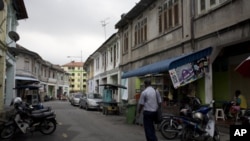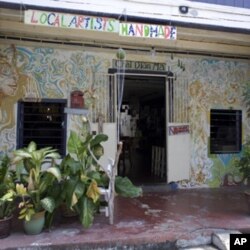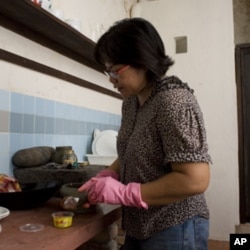On a quiet Saturday morning in Georgetown, the capital town of Penang, Malaysia, the sound of wooden doors creaking and occasional bicycles bell chimes greet the day. The heritage town, located on the island-state in the north of Peninsular Malaysia, is a living museum. Although none of the 'exhibits' are staged.
In Georgetown, most of its residents have lived in shop houses for decades, with some properties here being passed down from generation to generation since the British colonized the island in 1786.
While the former colonial rulers have left Malaysia, which obtained its independence in 1957, a strong colonial heritage still exists in Georgetown. This is particularly true in its architecture and the street names that range from Love Lane to Campbell Street. Decades-old businesses are the major fascination in this heritage enclave, as shown by guide maps detailing traditional trades found here, including the bamboo curtain maker, beaded shoe designer and joss stick maker.
However, Georgetown is also seeing an influx of young locals into the town center to start new business ventures. Since the city obtained its status as a UNESCO World Heritage City in 2008, there has been a steady stream of new restaurants, cafes and boutique hotels sprouting in Georgetown, mostly operated by locals under the age of 40 who see potential in expanding the hospitality and services sector.
A major draw for the young businessmen and women is the town’s charm. “There is a growing appreciation for old shop houses by tourists and residents alike and hence, life in Georgetown is appealing for living and running businesses,” said Hung, who runs a little cafe on Armenien Street.
He said with the recognition of Georgetown as a World Heritage enclave, young businessmen and investors now find an alternative to run businesses here instead of investing in commercial centres.
Hung's cafe can barely fit 15 customers, but he doesn't seem to mind running a small business in Georgetown. “The rent here is cheap, and I am not obligated to operate at stipulated hours, unlike operating in a shopping mall. As long as I maintain my quality of service and food, I have my little following of customers that gives me consistent businesses,” Hung said.
Another cafe owner, Dickie Tan, said while it is still unconventional for young people to run businesses in Georgetown, he liked the location it provided for his cafe. “This place is far from the maddening crowd. There is a quality of charm here,” he said.
In a sanctuary that looks like a little sanctuary for tourists, Tan's cafe serves gourmet coffee and french toast dripped in honey.
Efforts to restore Georgetown's pre-war shop houses have intensified among the property owners that now have access to grants given by government agencies, making it easier for new businesses to take off the ground in the last two to three years.
But, he said most of the businesses run by the young locals in Georgetown are operated in rented premises. “There is no way that we can afford to own properties here, as they are too expensive, unless you have [$1.2 million] of spare cash,” he said.
Property prices in Georgetown have risen sharply in recent years, as a result of the heritage status that prompted investors with deep pockets to buy up properties there. “Apart from buying the property, the owners have to fork out at least [$60,000] for restoration works. We can't afford to do that, but the rich investors are able to, as they see this as an investment opportunity,” he said.
Hung explained that some investors snap up properties in Georgetown to flip them when prices go up for capital gains. “But, I cannot afford to do this. I am also not interested in acquiring shop houses to sell them eventually, as I am a local born and bred in Penang. This means that my businesses are here to stay for the long-term.”
Dickie Tan said having foreign investors acquiring shop houses in Georgetown is good for his businesses, as it will introduce new visitors to the heritage enclave. “Georgetown needs fresh ideas to bring in a variety of tourists as well as local patrons. These investors may target a high-end market, but bringing a niche crowd into Georgetown will keep this part of town alive and also help my businesses grow.”
He said since the concept of running businesses is still new among young businessmen, most of the new operations sprouting in Georgetown are mainly in the food and beverage industry. “It is more a more sustainable model at this point of time.” But, he has set sights in opening a bookshop in this heritage enclave, if a well-maintained shop house is available for rent.
Nevertheless, new business ideas are emerging in Georgetown. Nazlina Hussin runs a cooking class in a pre-war shop house in Love Lane, which includes teaching tourists, mostly from Western countries, about local spices, Malay cuisine and giving market tours to her students.
“My business targets tourists that stay longer in Georgetown and are looking for a unique experience while staying here. Therefore, Georgetown is my natural choice as a business location because this is where the tourists are centred,” she said.
Nazlina said young Malaysians have returned to Penang to operate businesses in recent years after gaining experience running businesses abroad. “Those that have lived abroad are [savvier] in knowing how to appeal to a younger and Western-influenced crowd. So, they tend to understand the market that suits Georgetown today, especially since Penang is a popular destination among Western tourists,” she said.
As the young business community grows in Georgetown, so are the friendships growing among the owners. “We practically know everybody running the new businesses here, as Georgetown is still a small place and [it] is relatively easy to run into each other,” Nazlina said.






